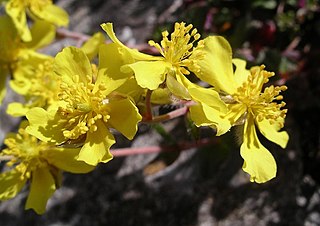
The Cistaceae are a small family of plants known for their beautiful shrubs, which are profusely covered by flowers at the time of blossom. This family consists of about 170(-200) species in eight genera that are not very distinct, distributed primarily in the temperate areas of Europe and the Mediterranean basin, but also found in North America; a limited number of species are found in South America. Most Cistaceae are subshrubs and low shrubs, and some are herbaceous. They prefer dry and sunny habitats. Cistaceae grow well on poor soils, and many of them are cultivated in gardens.

Helianthemum, known as rock rose, sunrose, rushrose, or frostweed, is a genus of about 110 species of flowering plants in the family Cistaceae. They are widely distributed throughout the Northern Hemisphere, especially in the Mediterranean.
In botanical nomenclature, author citation is the way of citing the person or group of people who validly published a botanical name, i.e. who first published the name while fulfilling the formal requirements as specified by the International Code of Nomenclature for algae, fungi, and plants (ICN). In cases where a species is no longer in its original generic placement, both the authority for the original genus placement and that for the new combination are given.

Helianthemum apenninum, the white rock-rose, is a white-flowering rock rose of the family Cistaceae found in the North Atlantic region, mainly in dry grassy and rocky places across large parts of Europe.

Helianthemum nummularium is a species of rock-rose (Cistaceae), native to most of Europe.

Pyrgus warrenensis, the Warren's skipper, is a species of skipper. It is a strictly Alpine species.

Helianthemum oelandicum, commonly called hoary rockrose, is a low growing plant confined to rocky dry calcareous areas especially close to the sea.

Purn Hill is a 6.1 hectare biological Site of Special Scientific Interest near the village of Bleadon, Somerset, notified in 1990. The site is a small promontory of Carboniferous Limestone projecting southward from the main Mendip ridge.

Crocanthemum scoparium, commonly known as the broom-Like frostweed or peak rushrose, is a small, drought-tolerant shrub native to North America, particularly in coastal and inland chaparral ecosystems of California, Baja California, and surrounding regions. It is a member of the Cistaceae family, which is well-known for its hardy, sun-loving plants adapted to dry climates. The plant is recognized for its upright, broom-like branches, which give it a distinctive appearance and its common name. It typically grows to about 1–3 feet tall.
Gastrolobium propinquum is a shrub in the family Fabaceae, endemic to the Southwest Australia savanna region, which is toxic to many animals. It has been given the common name Hutt River poison.
NVC community CG1 is one of the calcicolous grassland communities in the British National Vegetation Classification system. It is one of three short-sward communities associated with heavy grazing, within the lowland calcicolous grassland group, and is regarded as the south-west coastal counterpart of "typical" chalk grassland.

Pine Hill Ecological Reserve is a nature reserve of 403 acres (1.63 km2) located due east of Folsom Lake in the Sierra Nevada foothills, in El Dorado County, California. The reserve was established in 1979, and is managed by the Bureau of Land Management.

Coleophora ochrea is a moth of the family Coleophoridae found in Europe. It was first described by Adrian Hardy Haworth in 1828.

Mompha miscella is a moth in the family Momphidae, found in Asia Minor, Europe and North Africa.

Platynota flavedana, the black-shaded platynota moth, is a species of moth of the family Tortricidae. It is found in the United States from Minnesota to Maine, south to North Carolina and west to Arizona.

Helianthemum squamatum is a species of low woody herbaceous plant native to Spain and Algeria. It is the only known species able to extract water of crystallization from rock and is able to derive up to 90% of its fluid requirements from gypsum using this process.

Tuberaria lignosa is a species of perennial rock-rose native to the western Mediterranean region.
Crocanthemum dumosum, common known as bushy frostweed and bushy rockrose, is a perennial plant that is native to the United States.

Helianthemum canariense is a species of flowering plant in the family Cistaceae, native to Western Sahara, Morocco and the Canary Islands.

Crocanthemum is a genus of flowering plants in the family Cistaceae. They are native to both North and South America where they are widespread. The common name frostweed relates to the ice crystals which form from sap exuding from cracks near the base of the stem in the late fall.















